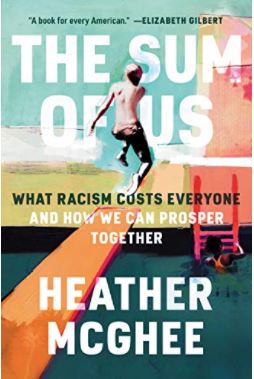
Heather McGhee’s recent book, The Sum of Us: What Racism Costs Everyone and How We Can Prosper Together, dispels the myth that righting the wrongs caused by institutional racism and discrimination is a zero-sum game, that is, what is good for someone else, is bad for me. Instead, she illustrates many times over how discriminatory policies not only hurt and diminish the target group, but she also writes how these bad policies and practices hurt the community as a whole.
The book covers many historical and current instances of laws that are aimed at Black people or other minorities. Each event was followed by how other people, usually poor, White people, are also adversely affected. For example, just after the Civil War, a critic of slavery named Hinton Rowan Helper wrote a book that asserted that slavery impeded the economic growth of non-slaveholders in the South. Slavery, which enriched a few, politically powerful landowners, meant that there was little investment in public benefits like schools, libraries, and similar institutions. His research found that states in the North, such as Maine, had 236 public libraries, while Georgia in the South, had only 38 public libraries. Similarly, the small state of New Hampshire had over 2300 public schools; Mississippi had only 782. The net result was that economy in the North was growing, but in the South, the economy was stagnant. The lack of investment in these public amenities not only hurt the suddenly free but extremely poor ex-slaves but also poor White people as well.
In more recent times, McGhee recalls a case from 1971, Palmer v. Thompson, where the U.S. Supreme Court decided that closing the public swimming pool rather than operating a racially integrated pool did not deprive Black citizens equal protection under the law. The Court’s reasoning was that Black residents did not suffer any discrimination because they were not singled out by not having access to public pools – White residents were equally deprived. No pools for anyone.
There was much resistance in trying to rectify these inequities, because opponents persuaded the public that reforms that gave benefits and resources to one group meant that there were fewer resources for everyone else – that is, they would suffer while others would prosper. And that did not seem fair.
So how does McGhee propose we move forward? Her theory is that solidarity is the answer. In the chapter where she talks about unions, she describes the history of one of the first labor unions, the Knights of Labor. Their working theory was to include everyone, no matter one’s race, ethnicity, or gender. All were welcome to join. They believed that if everyone united behind a single cause, say, an eight-hour workday, or limits on child labor, then management could not use one group of people against the other. And for a while, that worked. Many benefits workers receive today are due to the work on unions.
But as union membership decreased, so did their power. To illustrate this point, McGhee describes the attempt at starting a union at a Nissan plant in Mississippi that failed. While many workers wanted the protections from a union, enough people in management, people with longevity with the company, or people who had a chance at upward mobility at the company viewed the start of a union as a threat, and they managed to thwart the creation of the union.
In the last chapter of the book, she describes the revival of a town in Maine, which was in danger of withering away after the textile industry slowly closed down. In the late 1990s an influx of Somali immigrants helped revive the economy. Despite some ugly protesting by White Supremacists, the community, a mixture of long-time White residents and newer immigrants, thrived. In fact, the combined African immigrant population in the state added over $190 million in state revenue through taxes in 2018.
McGhee concludes her book with these inspirational words:
Since this country’s founding, we have not allowed our diversity to be our superpower, and the result is that the United States is not more than the sum of its disparate parts. But it could be. And if it were, all of us would prosper. In short, we must emerge from this crisis in our republic with a new birth of freedom, rooted in the knowledge that we are so much more when the “We” in the “We the People” is not some of us, but all of us. We are greater than, and greater for, the sum of us.